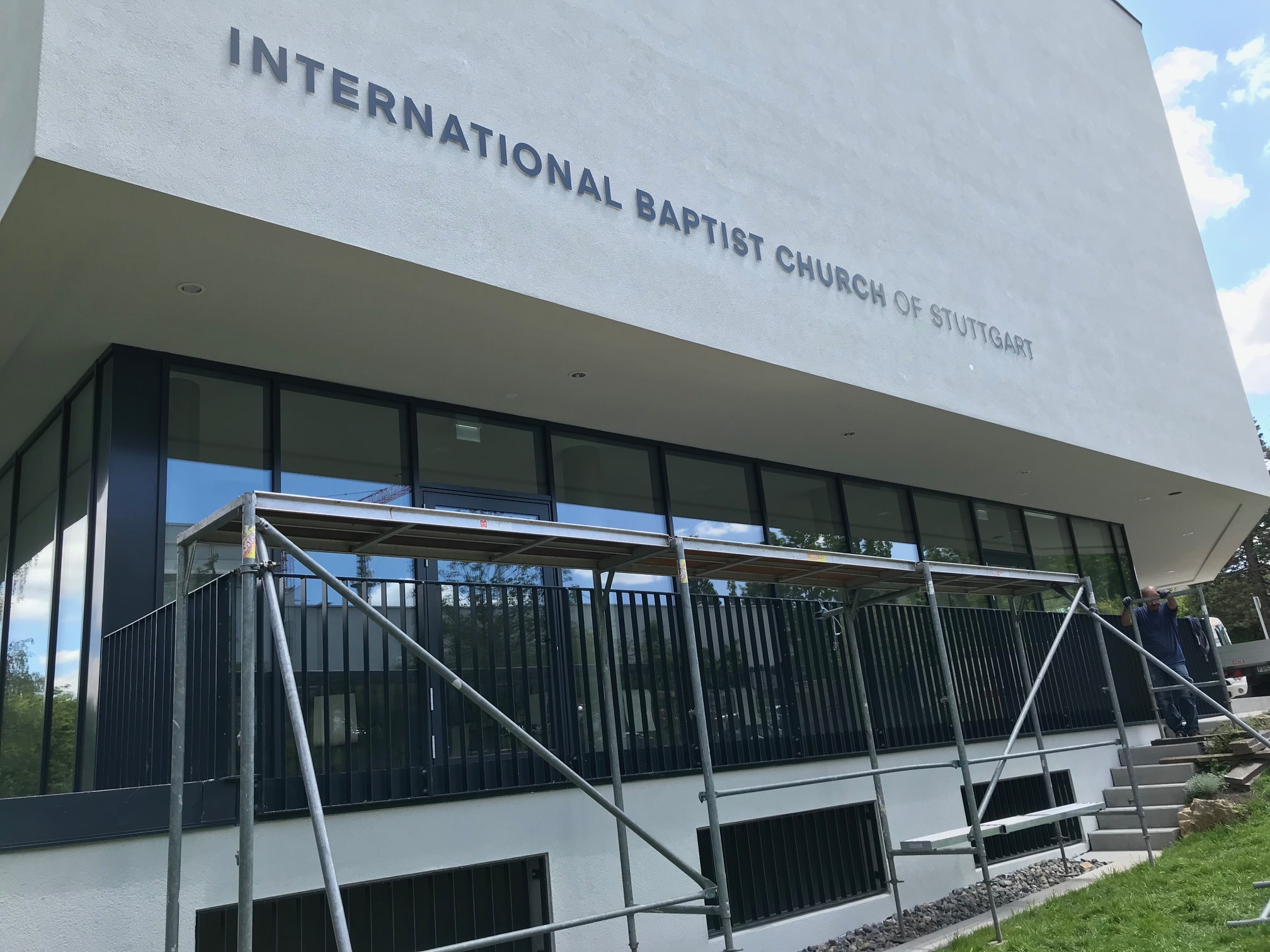Preparing an International Church to Build a New Building

In the next few weeks, after more than nine years of planning, praying, and promoting, the International Baptist Church of Stuttgart will complete a building project. This will be my second international church building project to see completed in my 25+ years of pastoring international churches overseas with IBC Singapore being the first. I have learned a great deal in these projects and am still learning. Both projects were multi-million-dollar projects. Both projects were done in strong unified agreement and support of the church body. Both took several years to complete from the initial envisioning stage to the completion. Both were financed completely by the church body, with no outside grants.
Churches need places to meet. We are commanded to continue to meet together to encourage one another (Hebrews 10:25). Moses prayed, “Lord, establish the work of our hands” (Psalm 90:17), and we establish and make strong the churches we serve by winning the lost, by training workers, by preaching the gospel, by organizing and leading, and by securing them a place to meet and to continue the witness of the church. “This space of the church does not exist just for itself,” Bonhoeffer wrote, “Rather, the space of the church is the place where witness is given to the foundation of all reality in Jesus Christ” (Ethics).
There are four stages of building any church building: envisioning, planning, giving, and building. Two essentials that should be inseparable parts of the entire process is prayer and communication. Throughout the process every church should pray and keep before it the words of Psalm 127:1: “Unless the LORD builds the house, the builders labor in vain.” And the pastor and the building committee should regularly communicate with the church body about the process. Even when there is not much to say, it is still important to remind the people that the work is continuing. “By wisdom a house is built” (Proverbs 24:3), and by wisdom a church house is built.
Envisioning Stage
All things spiritual and worth doing in the church begin with the movement of the Lord in the hearts and minds of the people. It may begin with the leaders of the church, but it will be more than an idea that is handed down to the people. It must come from united hearts that desire to honor God and reach the world for Christ. In both IBC Stuttgart and IBC Singapore, when I came to the churches to pastor, there had been several ideas already floating around the leadership about building, even some architectural sketchings about possible plans. These “false starts” were still starts nonetheless and helped pave the way for the eventual building plans.
Re-dreaming the original vision of the church is helpful. Why was the church started in the first place? The church needs to care about its people, about the program for its children, and for adequate space to worship the Lord. But it must also look beyond itself and care for the lost world. Preaching on texts such as, “I tell you, lift up your eyes and look at the fields, for they are ripe for harvest” (John 4:35), is helpful to create this sense of vision. The leadership should pray for their own hearts as well, that God might give them compassion for the lost around them and that the church body might also feel this same compassion and sense of mission.
Planning Stage
The next stage is to plan the work. The church leadership and the church body should have the confidence that God will lead them through this process, that He will give them the wisdom and unity to do what He wills them to do. The church should put its best and most visionary leaders on the planning committee. What the committee is called is immaterial. We simply called it the Building Committee, but it should have a written description of what it is to do. The church should elect this committee and take the matter seriously.
The first steps are to assess the needs and to explore the options. They should consider how much space they need for their church. They may also consider whether they should build or simply reorganize. They should report regularly to the church body. Trust should be established between the committee and the church body. At this stage there will be numerous recommendations that different people will make. They hear something or think something is possible and ask if they had thought about doing it. Most of these, I have found, are not realistic, but they should each be explored, and the people thanked for their suggestions.
The committee might also explore the possibilities of relocating, evaluating if they would be more effective in a different part of town. Action should not be taken until this work of evaluating is completed. Many churches have made quick decisions, hoping to save money or because someone wanted to get rid of some property, and it turned out to be a bad decision. Do the homework and make a proper assessment of your needs and your situation. Make sure the solutions will really allow room for growth.
Before you get to the fund-raising stage the church needs to be fully behind this project. Be sure that you have a united committee and that the leadership of the church are fully behind this. The vote to build should be a very strong vote, 90% in favor or at least 80%. If there is not a strong support for the project, the fund-raising stage will be difficult and painful.
Giving Stage
A spiritual and organized way to raise funds is very important. Churches should accept that this is an essential matter, that it is making an investment for the future of the church. In both of my international church building experiences we regularly reminded the people that we had been recipients of the generosity of Christians in the past, most of whose names we no longer know, but God knows them and what they have done! It is now our turn to do our part for God, for the church, and for the future.
You must take fund raising seriously. It cannot be merely one more thing that the church is doing those months. It must be the main thing that you are doing. The leaders should lead in generosity, with the pastor making the first gift himself. A biblical principle that is consistently seen throughout the building of the tabernacle and temple and the rebuilding of the temple is the willing hearts and participation of the people. Note these passages:
- And everyone who was willing and whose heart moved him came and brought an offering to the LORD for the work on the Tent of Meeting, for its service, and for the sacred garments. (Exodus 35:21, building the tabernacle)
- I know, my God, that you test the heart and are pleased with integrity. All these things I have given willingly and with honest intent. And now I have seen with joy how willingly your people who are here have given to you. (1 Chronicles 29:17, the first temple)
- Then the family heads of Judah and Benjamin and the priests and Levites – everyone whose heart God had moved – prepared to go up and building the house of the LORD in Jerusalem. (Ezra 1:5, rebuilding the temple under Zerubbabel)
The need and the building must be presented in a way that is prayerful, visionary, practical, and Christ-honoring. How much people give is between them and God. This giving should be above and beyond someone’s regular tithe or offering to the church. This is a special gift for the future of the church and is done in response to the movement of God in our hearts and done for the glory of God.
Building Stage
This stage involves making specific decisions. You must settle on a budget. The budget is usually settled in the vote for the project, but if not the church should vote on what the budget for the project will be. You must decide on a builder. A committee needs to make numerous decisions on the building, from the style of the building, to the cost for doorknobs and hinges, to the color of paint, to the size of classrooms.
Deciding on what to build can be based on a simple breakdown of your congregation into age groups. You can do a study of a typical Sunday attendance and break it down into percentages. For example, you might find that on a typical Sunday morning you have 45% adults, 35% babies and children, 30% youth. That is important to know, because probably even if you double in size you would still have the same percentage. Adults need 1 square meter per person. Youth need 1.2 square meters per person. Babies and children need 3 square meters per person.
It is also important to realize that churches are public buildings and need industrial-strength equipment. The same materials you would use in a private home will often not be durable enough for a church. So you have to think practical in these areas. And, of course, it is essential for Christians to obey the building laws of the nation they live in.
Building projects are inconvenient. In Singapore we met in a hotel for two years while we built. In Stuttgart we have met in the building but construction, with all of its dust and big equipment, has been all around us. Volunteers can do a great deal, but they usually cannot do everything due to government regulations that require workers to be trained and certified.
Preparing the People
Building a church building is a spiritual exercise. God must move in our hearts so that we are not satisfied with what we have or with what He has to work with in the church’s material equipment. A people’s love for God and for the work and witness of the church will be purified and clarified in a building project. United prayer of the church should deepen during the project and that will prepare the church for the future God has for it.
The construction should make sense biblically, spiritually, and practically. Through the project the church should learn to trust its leaders, and its leaders should learn how to work together. My experience is that a lot of grace is also needed because building projects also stress churches. Sometimes there are tense discussions, and disagreements must be worked through and unity found.
Germans say that you are not really married until a husband and wife have assembled an IKEA cabinet together. I believe we can say something similar about a church building project — that as challenging as it is, there is a tremendous sense of having joined hearts and hands together to construct a building that God will use for His glory for the future.
David Packer, Pastor, International Baptist Church, Stuttgart, Germany

